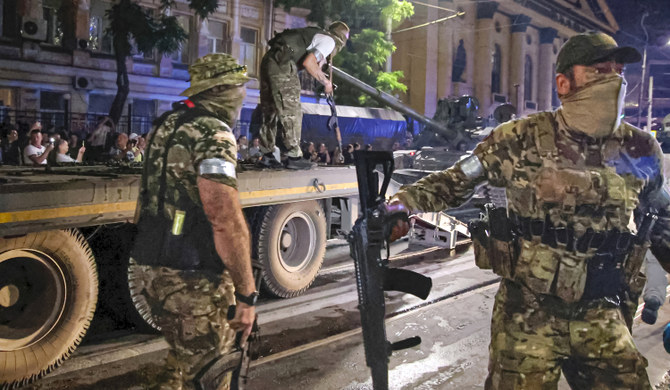
ANKARA: After the Turkish army raised the flag in Afrin to mark its success in taking the Syrian town, Syrian Kurds on Monday condemned the move and spoke of “occupation,” highlighting the challenges that lie ahead for Ankara.
Turkey’s military success now has to be translated into political stabilization following its 58-day offensive to clear Afrin of the local Kurdish militia, the People’s Protection Units (YPG), a Syrian offshoot of Turkey’s Kurdistan Workers’ Party (PKK) viewed as terrorists by Ankara.
The Turkish army, escorted by the pro-Ankara Free Syrian Army (FSA), took control of Afrin city center in Syria’s northwest on Sunday, the General Staff of the Turkish Armed Forces announced on Twitter.
Mohammad Al-Hamadeen, spokesman for the FSA, said they met no resistance when entering Afrin through three fronts. A search operation for mines and improvised explosive devices was underway.
The implications for US policy toward Syria remained to be seen, as the YPG has been Washington’s main partner against Daesh.
Ankara declared several times that its Afrin operation would help 350,000 to 500,000 Syrian refugees to return home once the area had been cleared of the YPG and the Democratic Union Party (PYD), the largest Kurdish group in Syria. But the British-based Syrian Observatory for Human Rights said that more than 200,000 civilians fled the city.
“With the liberation of Afrin, there is no more political claim for PYD/YPG for mounting a new resistance although their narrative is to continue it,” Sinan Hatahet, senior associate fellow at Al Sharq Forum and Omran for Strategic Studies, told Arab News.
Turkey wants to break what it calls a “terror corridor” along its border with Syria that is dominated by the YPG. Turkey might extend its operation east toward the town of Manbij, another YPG-held area, where US soldiers are present.
During the first meeting of the technical committee established by Turkey and the US that took place in Washington on March 8-9, the parties discussed their plans for Manbij and the potential withdrawal of the YPG.
Mete Sohtaoglu, an Istanbul-based researcher in Syria, expects Ankara to try to take the northwestern city of Tel Rifaat. “In this way, one of the main objectives of the Afrin operation will be achieved, that is blocking the main logistical entry point and cutting off the terrorists weapons’ supply in the east of Afrin,” he told Arab News.
In Afrin, according to Hatahet, Turkey will concentrate on establishing a local administration to maintain security as well as to establish and deliver services to the local population.
A group including Kurds, Arabs, Turkmen, Christians, Yazidis and Syrian opposition leaders from Afrin gathered in Gaziantep on Sunday and selected 30 council members to run the local administration.
Some experts have called for the region’s demographic composition to be maintained when resettling families in villages cleared of the YPG.
“Afrin city should be managed by its own dynamics. Turkey should prevent any attempt of demographic re-engineering,” Hatahet said.
Ankara, which denies its offensive had ethnic motivations, claims the town was dominated by Arabs.
“Fifty-five percent of Afrin is Arab, 35 percent are the Kurds who were later relocated, and about 7 percent are Turkmen. (We aim) to give Afrin back to its rightful owners,” Turkish President, Recep Tayyip Erdogan said in January.
Hatahet said that the Afrin operation also strengthened the Ankara-backed FSA rebels. “With this outcome, the FSA has proven to be capable of victory when it is adequately supported by a regional actor like Turkey,” he said.
Since the start of the offensive, 46 Turkish soldiers have been killed.
Ahmet K. Has, an international relations professor at Istanbul Kadir Has University, said key questions were whether the YPG had taken its heavy weapons when retreating and if there would be any remaining resistance to the Turkish army and FSA.
“YPG must now be realizing that it is doomed to lose against Turkey in any situation in which it does not have direct support from the West and the US,” he told Arab News.












